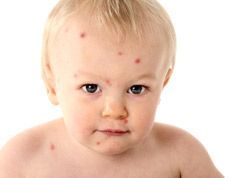Chicken Pox Decimated Among Kids, Though Continued Success Dependent Upon Vaccination Rates

Many Americans of a certain age fondly recall what now seems to be an absurdly anachronistic childhood rite of passage: staying home from school to watch daytime television while smearing oneself with a baking soda paste, the younger among us wearing sock-mittens to prevent scratching.
Nearly a generation after the emergence of a vaccine for the varicella virus, however, chicken pox is a distant memory, like the Reagan administration or station wagons with faux wood paneling.
Today, researchers from Kaiser Permanente in Northern California reported in the journal Pediatrics that the vaccine has indeed eviscerated the disease from childhood experience, literally decimating the number of chicken pox cases over a 14-year period.
In the study, investigators followed 7,585 children who received the vaccine between June and November of 1995, at 12 to 23 months of age. The research team followed-up every six months for 14 years, calling the children's caregivers to check for chicken pox or shingles, which is also caused by the virus.
During that period, parents reported slightly more than 1,500 "breakthrough" cases of the disease among vaccinated children, the equivalent of 15.9 cases per 1,000 "person-years." Researchers said the rate would have been ten times higher, at 140 to 160 cases per 1,000 person-years, without the vaccine. Moreover, severe cases of chicken pox became rarer with the vaccine.
Prior to the vaccine, most children who contracted the disease had a severe version, with at least 300 lesions on the body. Thousands of children were hospitalized and approximately 100 people died in this country every year from the disease.
The researchers also pointed to a concept shunned by many in the anti-vaccine community: "herd immunity." The disappearance of the disease from the population in general conferred a bit of immunity for people, regardless of vaccination, the said.
And not a single child developed the disease after getting a booster shot.
"Clearly, the vaccine is a very effective tool in preventing or limiting the severity of chicken pox in young people," said pediatric infectious disease consultant Dr. Randy Bergen, a pediatric infectious disease consult at Kaiser Permanente's Walnut Creek Medical Center.
Yet, Bergen expressed concern about future rates of chicken pox as parents question the safety and efficacy of vaccines in general, with some even organizing "pox parties" or exchanging infected candies with the intent of infecting their kids for a more old-fashioned type of immunization.
Other public health experts call such strategies misguided, saying they place children at increased risk of complications from infectious disease.
"I think it's an incredibly bad idea, whether you're getting it from a lollipop or somewhere else," said Dr. Rafael Harpaz, a medical epidemiologist at the Centers for Disease Control and Prevention. "Chickenpox can cause severe disease and death. Before the vaccine was available, we were approaching 100 children who died every year in the United States. You're basically playing a game of Russian roulette."
While the exchange of such materials is legal, U.S. law proscribes the sale of disease-infected items -- punishable by as many as 20 years in prison.
Published by Medicaldaily.com



























